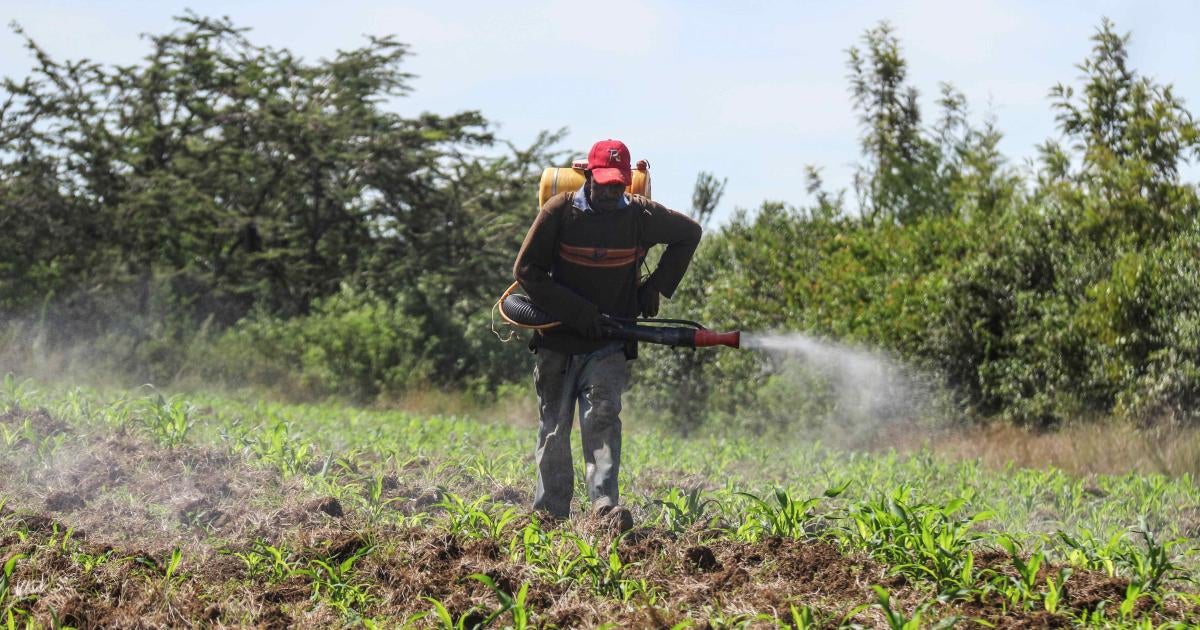(Nairobi, September 14, 2023) – A study released on September 13, 2023, in Kenya indicates that pesticides that are banned for use in the European Union due to their risks to health and the environment continue to be sold by European and other international companies in Kenya, Human Rights Watch said today. Kenyan authorities should ban all imports of highly hazardous pesticides and their active ingredients, phase out their use within the country, and invest in safer and more sustainable methods.
The study, published by The Route to Food Initiative (RTFI), a program advocating for the right to food in Kenya, says that in 2020 highly hazardous pesticides accounted for over 75 percent of the total pesticide volume in Kenya and nearly half were substances already banned in the EU due to their risks to health and the environment. The group called on the Kenyan government to urgently put in place regulations on highly hazardous pesticides, prioritizing a list of 40 ingredients identified due to their health and environmental risks and prevalence of use.
“It should go without saying that pesticides considered too harmful for people living in Europe are equally harmful for those living in Kenya,” said Julia Bleckner, senior health researcher at Human Rights Watch. “The European Union Commission should urgently introduce promised legislation to end the double standard of exporting dangerous pesticides that are already banned for use in the EU.”
Data on Kenya’s pesticide use in 2020 obtained from a private market research company by the RTFI indicates that the Chinese-owned Swiss company Syngenta and German Bayer AG had the largest market share by volume for pesticides in Kenya, together making up 35 percent. The group also found that over 65 percent of the pesticides sold by Sygenta and nearly 85 percent of those sold by Bayer in Kenya are classified as “highly hazardous” by the Pesticide Action Network, meaning they “are acknowledged to present particularly high levels of acute or chronic hazards to health or environment” under international classification systems. Some of the pesticides sold by these companies in Kenya in 2020 had already been banned in the EU.
The United Nations World Health Organization and the Food and Agriculture Organization developed the criteria for highly hazardous pesticides. However, because these organizations do not publish official lists of the chemicals meeting these criteria, the Pesticide Action Network regularly publishes an updated list of highly hazardous pesticides. To ensure strict application of the UN definition, the group uses more specific and stricter criteria.
The danger of highly hazardous pesticides is exacerbated in Kenya, where strategies and resources to minimize the effects of exposure are limited or not feasible. The location and size of farms means buffer zones are impractical for limiting pesticide drift or runoff to nearby homes, schools, and waterways. An Agrochemicals Association of Kenya study found that only 15 percent of farmers in Kenya wear full protective equipment when using pesticides for reasons including cost, lack of availability, or climate.
Exposure to hazardous pesticides can have severe effects on the human rights to health, to adequate food, to safe drinking water, and to a healthy environment.
In 2019, Gladys Boss Shollei, a parliament member, submitted a public petition about the issue to the Kenyan National Assembly, on behalf of a group of civil society organizations. In response, Kenya’s National Committee on Health “raised a red flag” regarding dangerously high pesticide residues on fruits and vegetables and called on the Ministry of Agriculture’s Pest Control Products Board to review the list of pesticides allowed in the country and put in effect urgent regulations for pesticide use.
In response, the Pest Control Products Board initiated a regulatory review of a priority list of active ingredients. In September 2021, the civil society organizations behind the 2019 petition submitted a dossier prepared by a task force of independent experts to the board, urging the Kenyan government to quickly put in effect regulations on highly hazardous pesticides. They prioritized a list of 30 active ingredients identified due to their risks and use prevalence.
On July 10, 2023, the Pest Control Products Board introduced new regulations limiting the use of nine active ingredients. The new regulations include restrictions on the use of four active ingredients included in the 2021 civil society submission: Pymetrozine, Thiacloprid, Chlorothalonil, Chlorpyrifos, all of which are already restricted or banned for use in the EU.
However, the full results of the review mandated in 2020 have yet to be published and civil society organizations continue to call for stricter regulations on a more comprehensive list of hazardous pesticides to adequately protect food safety, health, and the environment.
Kenya’s Pest Control Products Board should expedite and publish the findings of its review of hazardous pesticides initiated in 2020, Human Rights Watch said. The board should adopt and diligently enforce strict regulations and policies to phase out highly hazardous pesticides.
The Kenyan government should prioritize integrated pest management strategies that combine methods including crop rotation and diversification, biological controls, and phasing out hazardous pesticides. The government should also develop and subsidize the use of alternatives to hazardous pesticides in consultation with independent civil society organizations, agroecologists, health experts, and organic farmers. In Kenya, integrated pest management strategies should be urgently adopted for crops where hazardous pesticides are currently used at the greatest volumes, such as maize (corn), wheat, coffee, potatoes, and tomatoes.
Internationally, pesticides should be better regulated to protect the right to health, adequate food, and a healthy environment. In 2017, Hilal Elver, the then-UN special rapporteur on the right to food, and Baskut Tuncak, the then-UN special rapporteur on toxics, called for a new global treaty to regulate the use of hazardous pesticides to fill “a critical gap in the human rights protection framework,” stating the “widely divergent standards of production, use and protection from hazardous pesticides in different countries are creating double standards, which are having a serious impact on human rights.”
According to data reported in the Pesticide Atlas in 2020, binding international conventions apply to fewer than four percent of pesticides.
The EU Commission made a commitment in 2020 to ensure that hazardous chemicals banned in the EU are not produced for export. The commission plans to propose legislation by the end of 2023, though no draft legislation has yet been made public.
“The Kenyan government has in recent months taken important steps toward regulating certain harmful pesticides,” Bleckner said. “The government should build on this momentum by publishing the full results of the Pest Control Products Board review and creating stricter and more comprehensive regulations on hazardous pesticides to protect the right to adequate food and health.”



